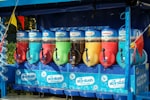It’s barely 2019 and we’re already hearing rumours and speculation about the Leafs and other NHL teams looking for European free agents to sign.
All of this has been helped along by Kyle Dubas heading over to Russia to watch some hockey. Why, back in my day, this sort of thing didn’t even start until the World Championships.
Given that we’re already discussing this sort of signing it’s time to delve into the CBA and Article 13 again to talk about an often overlooked rule. It’s the very last one in Article 13, and in some ways, it’s a remnant of the old CBA. Before the current rules were decided on in 2012, the NHL had re-entry waivers. These were waivers that players went through some of the time when they were called up to the NHL. They’re gone, and I don’t think they’re missed, but what remains is what’s colloquially known as entry waivers.
13.23 In the event a professional or former professional Player plays in a league outside North America after the start of the NHL Regular Season, other than on Loan from his Club, he may thereafter play in the NHL during that Playing Season (including Playoffs) only if he has first either cleared or been obtained via Waivers. For the balance of the Playing Season, any such Player who has been obtained via Waivers may be Traded or Loaned only after again clearing Waivers or through Waiver claim. This section shall not apply to a Player on the Reserve List or Restricted Free Agent List of an NHL Club with whom the Player is signing an NHL SPC or is party to an existing SPC with such NHL Club.
Waivers of all kinds exist to prevent NHL teams from stockpiling NHL-capable players in the minors or on loan to other leagues, and then popping them onto the roster to load it up if they’ve had injuries or if they just want to beef up for the playoffs without having to make a trade. The idea behind them is to make the access to players more equal, and to make sure the right players are in the NHL.
To this end, entry waivers exist to stop teams from adding on European players before the trade deadline and having a suddenly improved team for the playoffs.
All European league playoffs are finished by the end of April, and most contracts run either to the end of the team’s season or, in the case of the KHL, to midnight on April 30. That’s too late to get a player on your team for the playoffs, but if a team is out of contention, they might be willing to release players before the technical end of their contracts. By February 25, this year’s trade deadline date, the KHL regular season is over, although other leagues run longer.
But the Leafs can’t sign this year’s version of Igor Ozhiganov on February 25 to a deal to take effect in this season because he’d have to clear entry waivers to join the team. It’s not that it never happens. But the players signed this way are usually depth grinders or faint hope backup goalies, the late Ray Emery joined the Flyers this way in his last season of pro hockey after playing in the DEL for a while. Brian Gionta joined the Bruins last year after playing in the Olympics.
Any free agents the Leafs or anyone else are looking at are almost certainly signings to take effect July 1, 2019.
However, if you read that rule it says it doesn’t apply to players on the reserve list or players on loan to the European club. That means players the Leafs already have the rights to, who have been loaned to Europe, are eligible to join the team. They can even join their NHL team after the trade deadline and still play in the playoffs. For the Leafs, they haven’t got very many players out there that they could sign and add. But they do have a few who might turn up on the Marlies, where all they need is to be signed to a Professional Try-Out contract — they don’t even need to be signed to an SPC — and they can play out the AHL season and playoffs.
So, why not do that with the latest European man of mystery? Teams can, but the chances that any current, established, non-prospect European pro wants to play some AHL hockey to round out his season seems unlikely. Most players signed to fresh NHL contracts want to have a fair chance at training camp first to make the NHL club and never, ever ride the busses. Who can blame them?



